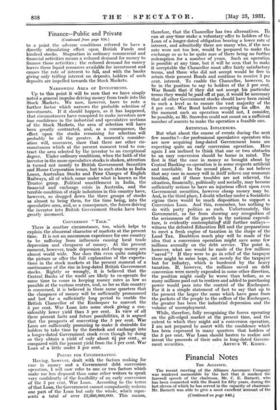ARTIFICIAL INFLUENCES.
But what about the course of events during the next few months ?--for professional speculative operators who are now acquiring long-dated Government loans are expecting quite an early conversion -operation. Here again I am inclined to think that one or two obstacles to an easy conversion should be borne in mind. The first is that the ease in money as brought about by Central Banking co-operation is in some respects artificial and unreliable. In the second place, I do not believe that any ease in money will in itself relieve our economic troubles, and if those troubles are not relieved, the situation, financially, politically and socially, may become sufficiently serious to have an injurious effect upon even Government securities, however cheap money may be. And, in the third place, I doubt whether under a Socialistic regime there would be much disposition to support a Conversion Loan. And this, remember, has nothing to do with party politics as such. Unfortunately, this Government, so far from showing any recognition of the seriousness of the growth in the national expendi- ture, is evidently - contemplating still further outlays— witness the defeated Education Bill and the preparations to erect a fresh engine of taxation in the shape of the Land Tax. Doubtless much play will be made of the idea that a conversion operation might save some few millions annually on the debt service. The point is, however, what use would be made of the few millions " saved " ? If they were to go in relief of the taxpayer there might be some hope, not merely for the taxpayer but for industry, which is burdened by the heavy taxation. If, however, the millions saved on debt conversion were merely expended in some other direction, the position might easily be worse than before, as so many millions paid out to rentiers and added to purchasing power would pass into the control of the Exchequer. For it is 'a simple statement of fact to say that up to the present the larger the sums which have gone from the pockets of the people to the coffers of the Exchequer, the greater has been the industrial depression and the volume of unemployment.
While, therefore, fully recognizing the forces operating on the gilt-edged market at the present time, and the extent to which they might aid a conversion operation, I am not prepared to assert with the confidence which has been expressed in many quarters that holders of the 5 per cent. War Loan should hasten to realize and invest the proceeds of their sales in long-dated Govern-






































 Previous page
Previous page